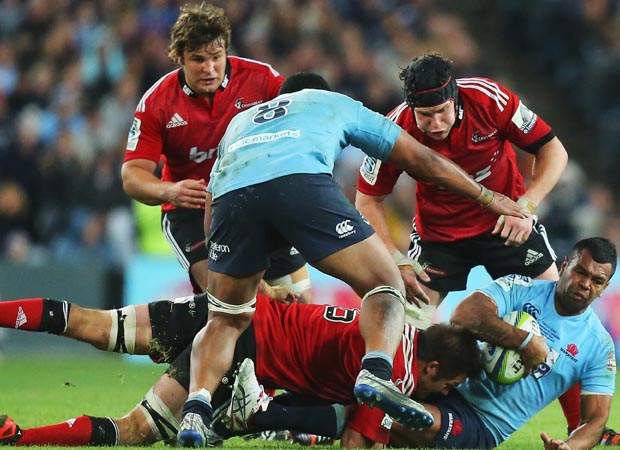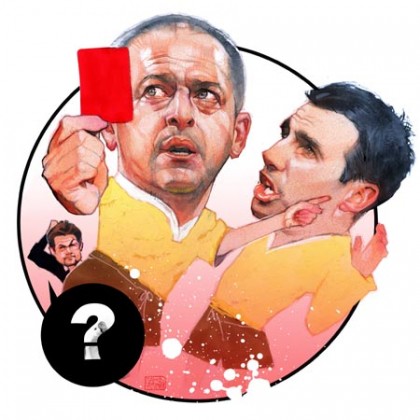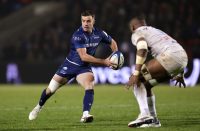 Refereeing at the elite end is reaching crisis point, and the IRB’s professional referees’ manager, Joel Jutge, needs to get a grip on it or the 2015 World Cup could degenerate to a point where mud-slinging over officiating standards gets more headlines than match action.
Refereeing at the elite end is reaching crisis point, and the IRB’s professional referees’ manager, Joel Jutge, needs to get a grip on it or the 2015 World Cup could degenerate to a point where mud-slinging over officiating standards gets more headlines than match action.
The other body that must flex some muscle are the IRB Match Official Selection Committee, who are responsible for the selection of professional Test referees, and therefore have the biggest influence on whether they are administering the laws as the IRB want them to. This is chaired by former Scotland and Lions back-row John Jeffrey, and currently comprises Jutge and former international referees Lyndon Bray (NZ), Andrew Cole (Australia), Donal Courtney (Ireland) and Clayton Thomas (Wales).
There is barely a high-profile match in the pro game that does not end with some recrimination over officiating, from poor and inconsistent refereeing to glaring flaws with the TMO system. An illustration of the mess that professional elite-end refereeing has got itself into came this week with the fall-out from the Super 15 final between the Waratahs and the Crusaders.
This saw South African international panel referee, Craig Joubert, come under fire from Jonathan Kaplan, a former South African international panel referee who retired barely eight months ago, with Kaplan homing-in on the last-gasp Bernard Foley penalty – given against Richie McCaw – that decided the match in favour of the Waratahs.
 Kaplan, who now has his own website, (‘Rate the Ref’), said Joubert had made a breakdown blunder despite McCaw coming in at the side: “The final penalty against the Crusaders was also incorrect as there was no tackle. This was indeed a very disappointing end to a very well refereed match, and the Crusaders would have reason to feel a little hard done by.”
Kaplan, who now has his own website, (‘Rate the Ref’), said Joubert had made a breakdown blunder despite McCaw coming in at the side: “The final penalty against the Crusaders was also incorrect as there was no tackle. This was indeed a very disappointing end to a very well refereed match, and the Crusaders would have reason to feel a little hard done by.”
One pro ref criticising another in open forum is not a great advert for the sport. This is mainly because if referees start back-stabbing and bickering in public it will bring the laws of the game and the people who administer them into question and diminish their authority. It will also raise the level of scrutiny, when most of us would prefer referees to be an adjunct to the action, rather than the main player on the pitch.
However, as long as there is inconsistency in elite refereeing and wilful refusal to apply basic laws, as a rugby journalist it would be dereliction of duty not to be critical if you know it’s to the detriment of the game.
On his blog Kaplan unwittingly let the cat out of the bag when it comes to elite refs being selective about which laws they apply and which they ignore, stating: “There are many laws which are written in the same ink as others which we knowingly choose not to apply. This has been done for years.”
If that is the case the rugby public – the paying public that keep the wheels of the pro game turning whether at the gate or in terms of buying broadcast subscriptions – should be told what they are.
Why should that information be the preserve of a tiny group of IRB officials and elite refs? Where is the transparency and the debate that would lead to a workable concensus, and an improvement in elite end refereeing accountability and standards.
The Waratahs v Crusaders final was a microcosm of many ills afflicting elite refereeing.
The Nemani Nadolo try just after the interval which got the Crusaders back into the game at 20-20 should have been ruled out by the TMO (George Ayoub), but he cannot have had the camera angles the rest of the TV audience had.
These made it clear that Kurtley Beale’s tackle forced the big wing’s foot to hit the touchline in goal before grounding.
Throughout the match Joubert was also guilty of allowing both the scrum-halves, Andy Ellis and Nick Phipps, to make scrum put-ins that were blatantly crooked. This, despite the IRB edict with the introduction of new scrum protocols this season, that the put-in should be straight – as the laws have stated unequivocally for all time.
There was also a classic case where Joubert showed zero empathy for the game, illustrating instead that, where he chooses he’s a stickler for the letter of the law, by enforcing immediate access to the ball for the attacking side.
It happened when Will Skelton made a good offensive tackle on Owen Franks, flipping him onto the Waratahs side of the ruck. However, this trapped Skelton in the ruck, and although he was not deliberately impeding anyone from getting the ball, Joubert awarded a penalty to the Crusaders (cutting the Waratahs lead to 30-29).
If Joubert and Ayoub were judged by the same standards as players and coaches in the pro game, on the evidence of the Super 15 final they would be in danger of being relegated to the second division – and staying there until they were good enough to win promotion.
Jutge and the IRB Match Official Selection Committee have to raise their game as a matter of urgency, or it will be pro referees who end up in the dock for bringing the game into disrepute.
*This article was first published in The Rugby Paper on August 10.























